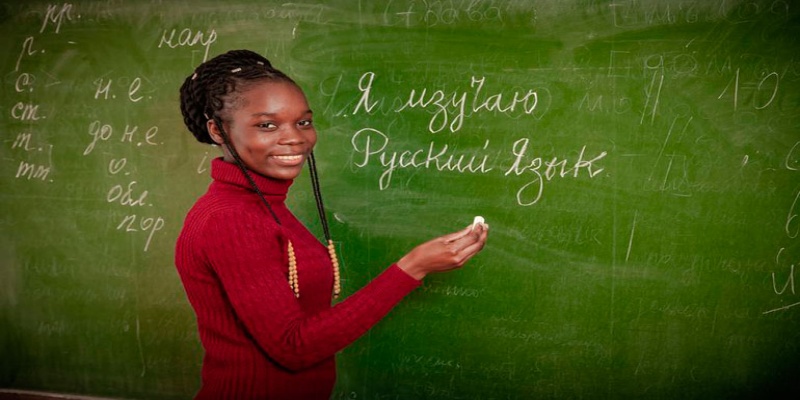Russian Language: Too Little, Too Late for Africa?

The study of Russian language is hitting magnificent roadblocks in Africa. Although Moscow has been stepping up efforts to strengthen the Russian language study across Africa, tangible results have been little due to the fact that its usefulness is blurry compared to other foreign languages like French, English and Chinese.
There has been an increasing concern about Russia's extreme low presence in Africa. Russia's initial interest was to become part of Europe and construct business ties from Lisbon to Vladivostok. Due to the changing geopolitical situation, Russia now hopes to normalize cultural relations with Africa but is hampered by multiple challenges.
The Kremlin leadership, Ministry of Foreign Affairs and the NGOs including Russkiy Mir Foundation, created for supporting the language study inside Africa, have to seriously prioritize various motivating factors such as broad all-year-round tourism, people-to-people exchanges, cultural linkages, and more educational collaborations. Trade ties, especially the small and medium scale operators in the private sector (as opposed to state corporate commercial deals) and business people's interactions are highly limited between the two regions.
Critics say that Russia, a staunch advocate for multipolarity, is still far from being receptive, inclusive, interactive and integrative with foreigners. As it appears, Russia's irreconcilable cultural differences and colour discrimination attitude make the country a segregated society. Potential African learners see few opportunities in using the Russian language to bolster bilateral cultural relations with Africa and dispel stereotypes. Russia's tourism destination spots are still not popular among the middle-class estimated at 350 million, that is double the population of Russia.
Most Africans study foreign languages to ensure smooth participation in interstate activities such as trade and relating with people abroad. Foreign countries, for example Britain, the United States, European countries and now China are traditional favorites. These countries have interactive programs and cultural activities throughout the year to forge external multifaceted relations.
Russia has not been a major economic giant in Africa compared to Western and European countries and China. Due to this historical truth, Africans have little interest in studying Russian language and its culture. The Russian language itself does not sound attractive in terms of its economic opportunity. Russia appears quite removed from Africa's development issues. It is only mentioned in limited areas like weapons and military equipment supplies to French-speaking West Africa. China, on the other hand, is making huge contributions in the continent. This has made Africans to see the need to study the country’s language in for better interaction and long-term friendship. China has more than 20 Confucius Centers, and a party school in Africa.
Russian authorities are struggling to market the country's language abroad by establishing language centres, for instance in Morocco, Egypt, Ethiopia, Cameroon, Nigeria and South Africa. Central African Republic, Burkina Faso and Mali have declared Russian language as the second language, compulsorily to be studied in national schools and as oriented-strategy for consolidating cultural cooperation with Russia.
In June 2001, Russkiy Mir Foundation was created by a decree of Russian President Vladimir Putin to restore Russian cultural image, promote Russian language and its literature abroad. Russia House, a non-government organization, has designed a large-scale educational project titled 'Distant Russian in Africa' which consists of free intensive Russian language courses and professional development seminars. Its co-organizers are the Institute of Russian Language and Culture (IRLAiK) of Moscow State University and the Russian Center for Science and Culture in Tanzania. Sources, however, indicate that Russian as a foreign language started last summer in Tanzania, Zambia, Uganda, Kenya, Mauritius and Madagascar. Moscow State University usually holds training for educators from East African countries.
Observers suggest that pursuing geopolitical and cultural goals in Africa require well-defined approach and strategies. Russia and Africa should have more and more youth exchanges and short-term programs designed for the youth from political, public, scientific and business circles to get acquainted with the people, the city's landscape and interesting cultural spots in the Russian Federation.
Africa has the fastest-growing population in the world. Over 50% of people living in Africa are under the age of 26. Offering these youth modern technology in addition to Russian language would develop their entrepreneurship and leadership qualities, and simultaneously build unique bridges for future collaboration between Africa and Russia.
Joint declarations, both in Sochi and St. Petersburg, suggested that Russian authorities would actively engage in meaningful cooperation in Sub-Saharan Africa.
By Kester Klomegah
The author writes on Russia, Africa and the BRICS.
